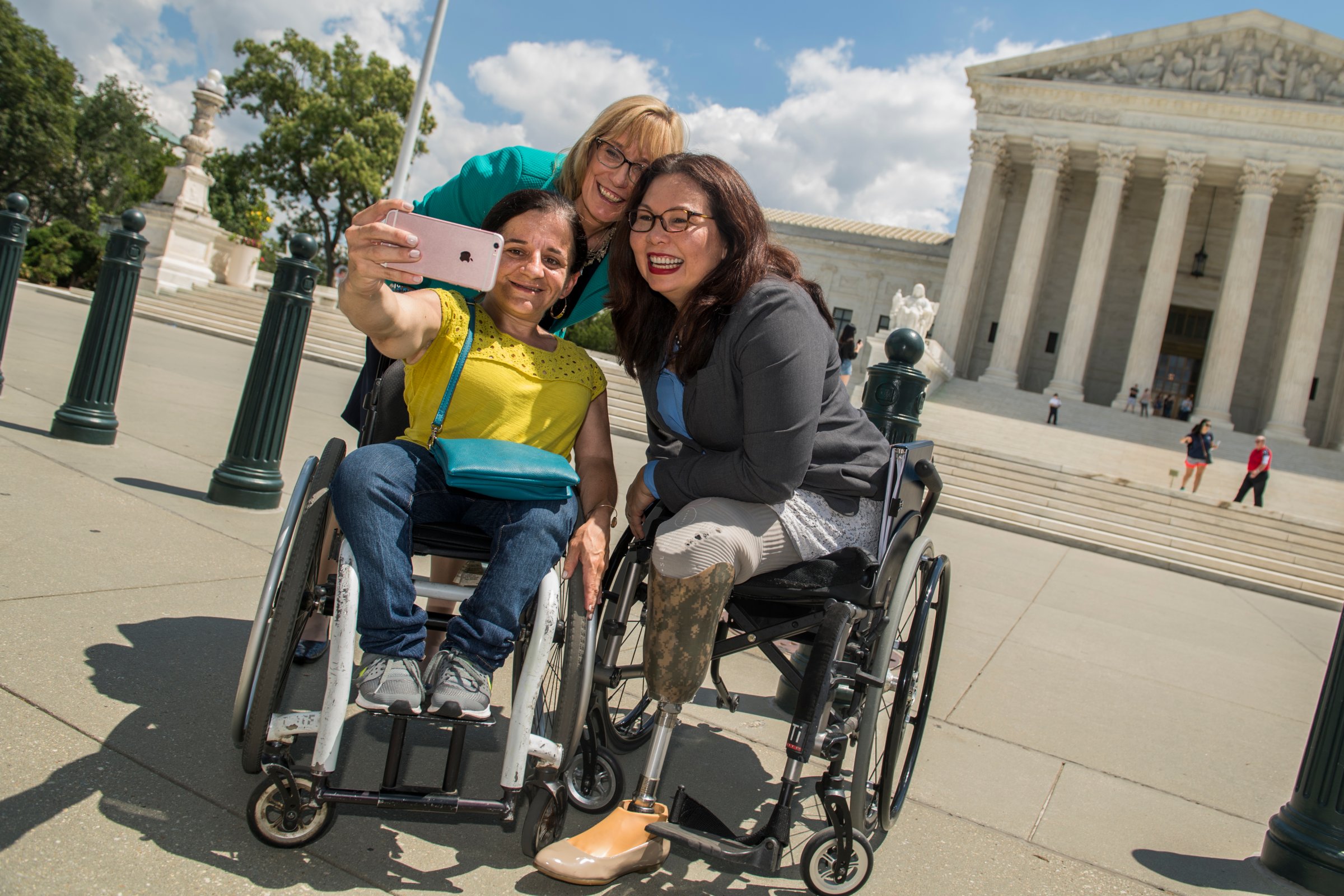
When I first woke up at Walter Reed in November 2004, I had no idea that I was disabled.
I had no idea that, in the blink of an eye, I had lost both my legs when a grenade tore through the helicopter I was piloting just north of Baghdad.
It took me days to recognize the reality of my disability, months to learn how to walk again and years to get used to the constant, hammering pain that’s still there, even when I’m just sitting down.
Despite it all, I consider myself pretty lucky — not only because of the fantastic medical team that helped me recover and the VA care I still receive today, but also because I am an American with disabilities, which means the Americans with Disabilities Act is in place to safeguard the basic rights I rely on to lead a full life. The rights that activists with disabilities fought so hard for, for so long. That they left their wheelchairs and crawled up the Capitol steps for. The rights that thankfully, finally, got enshrined into law in 1990.
That isn’t to say there aren’t still struggles, and we still have a long way to go to achieve true equality. Nearly three decades after the ADA became law, far too many public places continue to be inaccessible and difficult to navigate. On every issue — including transportation, housing, education, health care and employment opportunities — we’re still working hard toward the goal of ensuring that Americans with disabilities are able to live independently in their communities.
But even so, it’s hard to imagine the exhaustion and frustration that Americans with disabilities must’ve felt every day in the years before the ADA became law — when our country openly and unabashedly discriminated against our entire community.
And I worry that rather than making progress, the hellish, relentless discrimination of pre-ADA America could become a reality once again for me and for millions of other people with disabilities if Judge Brett Kavanaugh is confirmed to the Supreme Court.
Judge Kavanaugh has shown us what he believes about disabled Americans. In Tarlow v. D.C., he ruled that those with mental disabilities shouldn’t have the right to make medical decisions about their own bodies. In Baloch v. Kempthorne, he declared that businesses’ profits are more important than our health. And in Johnson v. Interstate Management Company, he decided that it’s okay for employers to discriminate against us, too.
The cases are different, the plaintiffs change, but one fact remains the same: Judge Kavanaugh’s rulings make clear that he’s just not concerned whether we’re able to go to school, get decent health care, eat at a restaurant like anyone else or even earn a livable wage.
Well, I am. And I’m going to fight as hard as I can these next few weeks to make sure that our next Supreme Court justice isn’t someone who thinks we’re less worthy of our rights than able-bodied Americans.
But I can’t do it alone, which is why I’m so lucky to have the disability community at my side, pushing to expand access and protect our rights against attacks from Donald Trump, the Republicans and Judge Kavanaugh.
The disability community proved the power that it wields during last year’s fight to protect the Affordable Care Act. It proved that power again when it helped me lead a group of 43 Senators to block Republican efforts to roll back ADA protections and reward businesses who’ve failed to comply with the law after nearly 30 years.
And when it comes to Judge Kavanaugh, we need to show that same strength 10 times over.
Because it’s not “just” our health care on the line in this fight — though that’s at stake too, as his record suggests that he’d vote to take away protections for people with pre-existing conditions.
Our civil and voting rights are also on the line, as cases rise through the courts that would make it harder for Americans with disabilities to participate in the democratic process and vote.
Women’s rights are on the line, as the judge has previously sided against expanding health care access to more women—and would likely be the deciding vote to repeal or roll back Roe v. Wade, putting the government in between women and their doctors.
Immigrants’ rights are on the line. As are LGBTQ rights. As is our economic security and our kids’ future. Our public schools and our planet, too.
Every issue is a disability issue, because our community — at 60 million strong — is beautifully diverse. That’s a gift, but also a responsibility. Because it means we have to fight for every American with disabilities, whether they’re undocumented or disenfranchised or sick and in need of care. No matter what.
Truthfully, this confirmation process isn’t really about whether some judge can sit in fancy robes in a courtroom in D.C. This is about our most basic rights. And there are only a few weeks left to stop a confirmation that could change our lives forever.
So from this moment until the final vote is cast, I’m going to be fighting right alongside every other activist with a disability. Working together. Speaking as one. Proving the power of a community that only grows stronger every time someone like Brett Kavanaugh tries to strip us of our rights.
More Must-Reads From TIME
- The 100 Most Influential People of 2024
- Coco Gauff Is Playing for Herself Now
- Scenes From Pro-Palestinian Encampments Across U.S. Universities
- 6 Compliments That Land Every Time
- If You're Dating Right Now , You're Brave: Column
- The AI That Could Heal a Divided Internet
- Fallout Is a Brilliant Model for the Future of Video Game Adaptations
- Want Weekly Recs on What to Watch, Read, and More? Sign Up for Worth Your Time
Contact us at letters@time.com